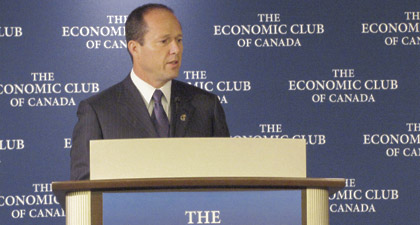TORONTO — Nir Barkat, the mayor of Jerusalem, has big plans for Israel’s capital.
Speaking to the Economic Club of Canada earlier this month, Barkat, a 52-year-old former high-tech executive, outlined an ambitious and upbeat program for its economic and cultural development.
Barkat, who marked the third anniversary of his mayoralty on Nov. 11, wants to transform Jerusalem into a thriving, open and vital city for its 800,000 Jewish, Muslim and Christian inhabitants.
Calling Jerusalem not only “the heart and soul of Israel,” but “the spiritual centre” of non-Jewish believers around the globe, Barkat said he intends to resolve two of its chronic problems – migration and poverty – while pressing ahead to revitalize the city.
“It was clear we had to change course,” Barkat said, explaining that economic progress will enable Jerusalem to fulfil its huge potential.
Identifying three engines of future growth, Barkat cited tourism, health and life sciences, and professional services.
Jerusalem must develop its cultural infrastructure so that tourism can thrive, Barkat said. ”We’re tripling the number of cultural events. We want to share the beauty of Jerusalem with the world.”
At present, he’s focused on developing the City of David and the Western Wall Plaza and expanding nighttime activities.
Describing Jerusalem as “a great brand,” he said his goal is to increase tourism from the current 3.5 million to 10 million per annum.
“We will get there,” said Barkat, who signalled his intention to run for another term. “There is no doubt in my mind.”
Jerusalem, with its network of hospitals and start-up companies, is also trying to upgrade its health and life sciences base.
Foreign and local investors can take advantage of “significant tax incentives,” he said, adding that bureaucratic obstacles are being eliminated.
“We’re cutting red tape and making the cost of doing business in Jerusalem more competitive.”
In addition, Jerusalem is modernizing its professional services sector, which serves both internal and external markets.
As a result of these initiatives, Jerusalem’s unemployment rate has dipped below the national average, while tourism has risen by 24 per cent, he disclosed.
Barkat said his master plan envisages the development of more neighbourhoods for business purposes.
For example, he said that 13 buildings, each more than 30 stories high and with a total of more than 10 million square feet, are currently being constructed at the entrance to Jerusalem.
Barkat hopes to enlarge Jewish and Arab neighbourhoods simultaneously. If he can’t implement this plan, young people will leave the city and Jerusalem will become poorer, he warned.
Rejecting Palestinian demands for a building freeze, Barkat said, “We will build honestly for all people who want to live in Jerusalem. Jerusalem belongs to everyone.”
Saying that Jerusalem will not be divided again, he promised it will continue to function as “a united city.”
He claimed that the vast majority of its Muslim and Christian residents, comprising about one-third of its population, prefer a united Jerusalem under Israel’s control.
Israel conquered eastern Jerusalem in the 1967 Six Day War, wresting it from Jordan, and enlarged the city’s boundaries with territory acquired in the West Bank.
Through all the conquests of Jerusalem over the centuries, only Israel has regarded it as its capital, Barkat said.
Israel, too, has permitted freedom of religion in the city, he pointed out, comparing the Arab world’s instability with the relative stability that reigns in Israel and Jerusalem.
Barkat thanked Canadian Prime Minister Stephen Harper for his “unprecedented support of Israel, based on shared values and beliefs.”
He added: “Canada has shown consistency in its strategic alliance with Israel.”
